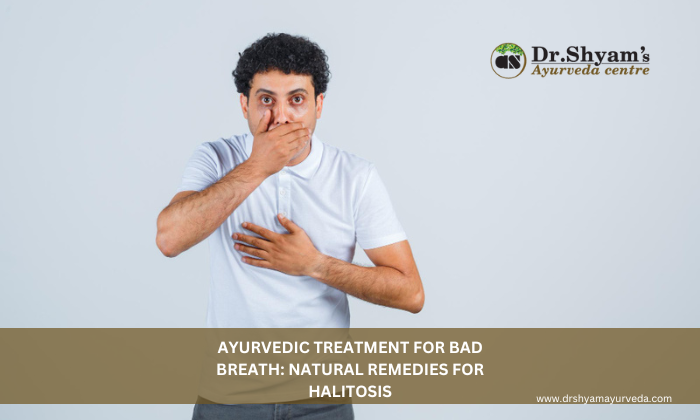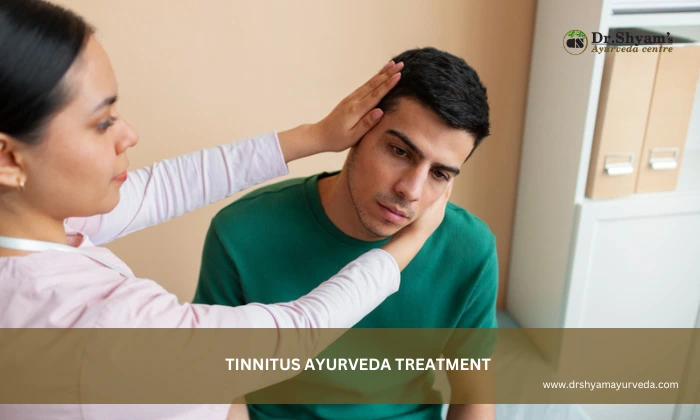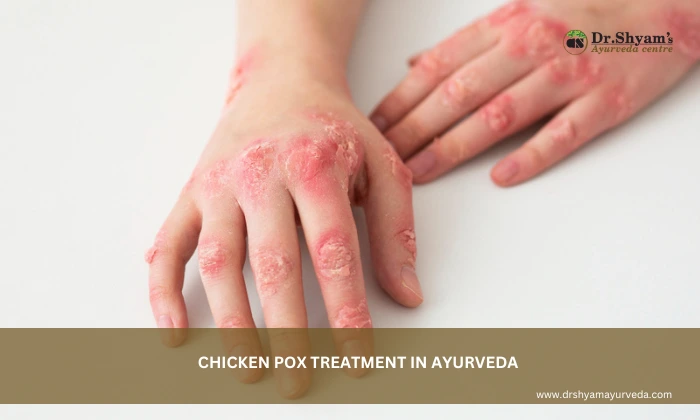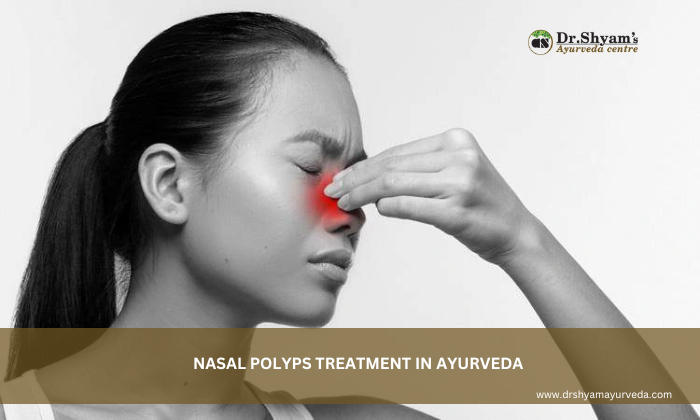Halitosis is the medical term for bad breath. It is an unpleasant odor from the mouth caused by bacteria on the tongue, dry mouth, poor oral hygiene, medications, certain foods, or underlying health issues such as infections, gum diseases, respiratory diseases, or diabetes. It can be a serious concern for the individual, as it can affect confidence and social interactions and leave them reclusive or stigmatized.
Ayurvedic treatment for bad breath helps regain fresh breath by addressing the root imbalance—whether in the gut, oral cavity, or respiratory system. Unlike mouthwashes or mints, Ayurveda offers long-term solutions through herbs, detox, and lifestyle changes.
Understanding Bad Breath in Ayurveda
In Ayurveda, bad breath can be correlated to Putyasyata, a condition characterized by foul odor from the mouth. Ancient Ayurvedic textbooks such as Ashtanga Hridayam classify Putyasyata under Mukha Roga (diseases of the mouth).
It is caused by the vitiation of three doshas—Vata, Pitta, and Kapha. This imbalance, along with poor oral hygiene, accumulation of ama (toxins), or underlying health conditions, can lead to unpleasant odor. The common symptoms may include persistent bad breath, altered taste, and a white coating on the mouth associated with dry mouth, postnasal drip, gum swelling, or indigestion.
Ayurvedic Medicine for Bad Breath
Ayurvedic treatment for bad breath focuses on balancing the doshas, eliminating the toxins, improving digestion and metabolism, and maintaining oral hygiene. Commonly recommended Ayurvedic medicines for bad breath include:
- Triphala Churna: Helps detoxify the gut, improves digestion, and is useful as a gargle or internal medicine.
- Khadeeradi Vati: A classical formulation for oral health, gum diseases, and bad breath.
- Yashtimadhu: Used as a decoction or powder for gargling to reduce dryness, inflammation, and odor.
- Lavanga: Acts as a natural mouth freshener, antimicrobial, and digestive stimulant.
- Trikatu Churna (Ginger, Black Pepper, Long Pepper): Improves digestion, reduces ama, and reduces halitosis linked to indigestion.
- Hinguvastaka Choornam: Helps relieve indigestion, bloating, and ama, addressing halitosis caused by poor digestion.
Ayurvedic Medicine for Breathing Problems Related to Bad Breath
When bad breath is associated with breathing difficulties, it is often associated with Kapha accumulation in the respiratory tract, chronic sinusitis, or digestive imbalances leading to excess ama. Ayurveda recommends formulations that help clear the respiratory passages, improve digestion, and detoxify the system.
- Sitopaladi Choornam: Beneficial in cough, breathlessness, and digestive weakness that may contribute to halitosis.
- Vyoshadi Vati: Beneficial in cough, asthma, and respiratory discomfort.
- Talisadi Choorrna: Supports respiratory strength and digestion.
- Inhalation with medicated steam (Swedana): Clears blocked sinuses that may cause a foul smell.
Natural Home Remedies in Ayurveda for Bad Breath
The natural home remedies in Ayurveda for bad breath include:
- Chew fennel seeds: After meals, chew a teaspoon of fennel seeds to freshen the breath and support digestion.
- Incorporate clove: Chewing whole cloves or drinking clove-infused tea helps fight bacteria associated with halitosis.
- Gargle with Triphala decoction: Prepare the decoction by dissolving ½ to 1 teaspoon of Triphala powder in a glass of warm water. Stir well to ensure it is mixed properly. Take a mouthful of the solution and gently swish the liquid around your mouth, between your teeth, and along your gums. Do this for about 5 minutes, ideally in the morning.
- Chewing Fresh Herbs: Chew on fresh leaves of tulsi (holy basil), mint, parsley, or cilantro to freshen your breath naturally.
- Herbal Mouthwash: Gargle with warm water mixed with antimicrobial herbs like neem, clove, or peppermint.
Panchakarma Treatment for Bad Breath in Ayurveda
Panchakarma therapies help eliminate the toxins, balance the vitiated doshas, and restore the balance. The common therapies include:
- Nasya: Administration of medicated oils through the nasal passage helps clear toxins from the head and neck, improving oral health and sinus health and reducing foul smell.
- Kavala and Gandusha: Though technically part of Dinacharya, these are integrated into Panchakarma therapy. Daily oil pulling or gargling with medicated decoctions or oils strengthens gums, reduces bacterial growth, and eliminates bad odor.
- Vamana (therapeutic emesis): In selected cases with excessive Kapha accumulation (thick coating on the tongue, excessive salivation, heaviness), Vamana is advised.
- Virechana (therapeutic purgation): Recommended when halitosis is associated with Pitta imbalances and digestive disturbances.
Disclaimer: Always seek guidance from a qualified Ayurvedic doctor before starting any treatment or formulations.
Lifestyle & Diet Tips for Long-Lasting Fresh Breath
Simple Ayurvedic lifestyle and dietary practices can help keep breath naturally fresh and prevent halitosis in the long run.
Lifestyle Tips
- Daily Oral Care (Dincharya): Brush twice daily with herbal tooth powders or pastes (containing neem, clove, or triphala).
- Tongue Scraping (Jihwa Nirlekhana): Use a copper or steel scraper every morning to remove tongue coating and toxins.
- Oil Pulling (Gandusha): Swish sesame oil or coconut oil in the mouth for 5–10 minutes to cleanse and strengthen oral tissues.
- Stay Hydrated: Drink warm water throughout the day to prevent dryness of the mouth, a common cause of bad breath.
- Manage Stress: Practice pranayama and yoga to support digestion and respiratory health.
- Adequate Sleep: Ensure proper rest, as lack of sleep and stress can worsen digestive issues that contribute to bad breath.
Diet Tips
- Eat Fresh & Light: Prefer freshly cooked, sattvic meals rich in vegetables, whole grains, and seasonal fruits.
- Avoid Ama-Producing Foods: Limit fried, oily, processed, and heavy foods that impair digestion and cause toxins.
- Spice Up Digestion: Use digestive spices like cumin, ginger, black pepper, and hing to prevent bloating and indigestion.
- Reduce Mucus-Forming Foods: Cut down on excessive dairy, sweets, and cold foods if you are prone to Kapha-related bad breath.
- Regular Meal Times: Eat at fixed intervals to maintain digestive balance and prevent fermentation in the gut.
Ayurvedic Body Type and Susceptibility to Bad Breath
According to Ayurveda, every individual has a unique body constitution (Prakriti), determined by the dominance of Vata, Pitta, or Kapha dosha. This natural constitution influences not only physical and mental traits but also one’s vulnerability to health conditions.
Vata Body Type
- Prone to dryness of the mouth, reduced salivation, and coated tongue due to irregular digestion.
- Bad breath in Vata individuals often arises from dryness, constipation, or weak digestive fire (Agni).
Pitta Body Type
- Susceptible to sour, strong, or offensive odor in the breath due to excess heat, hyperacidity, or inflammation in the gums and stomach.
- Commonly associated with gastritis, ulcers, or liver-related imbalances.
Kapha Body Type
- More likely to develop a thick tongue coating, excessive salivation, and a heavy, foul smell.
- Bad breath in Kapha types is linked with mucus accumulation, sluggish digestion, and oral infections.
You may like: Ayurvedic Body Types
Bad breath often reflects deeper imbalances in digestion, oral hygiene, or overall health. Ayurveda not only provides natural remedies to freshen the breath but also addresses the root causes through herbal medicines, detox therapies, and lifestyle changes.
If you are struggling with persistent halitosis, it is best to seek professional care tailored to your body type and health needs. At Dr. Shyam’s Ayurveda, we offer personalized Ayurvedic treatment in Dubai for bad breath and related digestive or respiratory concerns. Our expert team combines classical Ayurvedic wisdom with modern understanding to help you regain confidence and lasting oral freshness.
Visit us, experience the best Panchakarma treatment in Dubai, and take the first step toward holistic healing and a healthier, fresher you.
FAQs
What is the best Ayurvedic medicine for bad breath?
The best Ayurvedic medicines for bad breath include Triphala Churna, Khadeeradi Vati, Yashtimadhu, Lavanga, Trikatu Churna, and Hinguvastaka Choornam. As formulations may depend on many factors and your unique prakriti (constitution), it’s best to consult a qualified Ayurvedic doctor to get the right medicines for your needs.
Can Ayurveda permanently cure halitosis?
By addressing digestion, oral hygiene, and dosha imbalance, Ayurveda offers long-term relief from bad breath.
Is oil pulling effective for bad breath?
Yes, oil pulling is effective for bad breath, as it reduces oral bacteria, dissolves toxins, and improves gum health naturally. Studies show sesame or coconut oil pulling lowers plaque and odor, but it should be used as an adjunct to regular brushing and flossing.
Which foods should I avoid if I have bad breath?
You should avoid onions, garlic, fried foods, alcohol, and excessive spices, as they produce strong odors and aggravate digestion-related halitosis. Limiting smoking, caffeinated drinks, and stale foods also helps maintain fresh breath.
How long does Ayurvedic treatment take to show results?
Mild cases improve in 2 to 4 weeks; chronic cases may need Panchakarma and long-term care.
BRANCHES
JUMEIRA-+971434443354
KARAMA-+97143426434
AL NAHDA-+97142207003
RAK-+971559835111
AJMAN-+971167441423,+971506766269
HELPLINE-0561151269,0561144248











